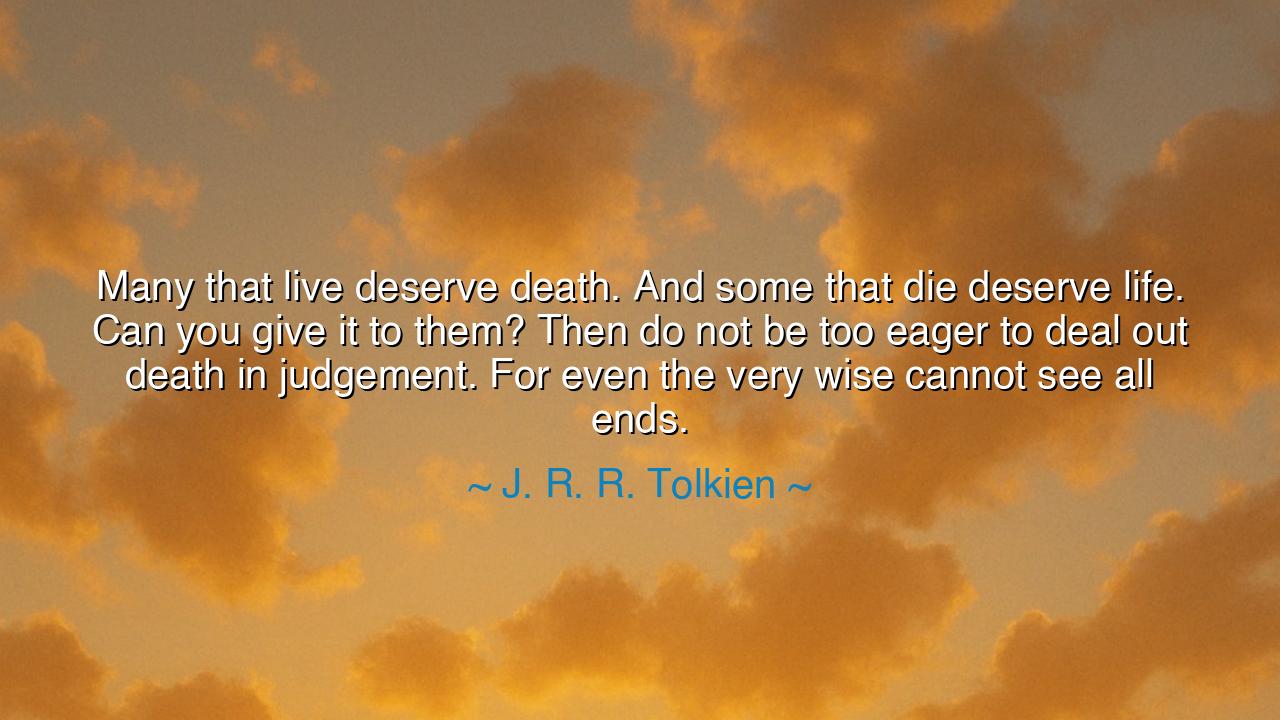
Many that live deserve death. And some that die deserve life. Can
Many that live deserve death. And some that die deserve life. Can you give it to them? Then do not be too eager to deal out death in judgement. For even the very wise cannot see all ends.






“Many that live deserve death. And some that die deserve life. Can you give it to them? Then do not be too eager to deal out death in judgement. For even the very wise cannot see all ends.” Thus spoke J.R.R. Tolkien, through the voice of the wise Gandalf in The Lord of the Rings. These words, spoken softly in the darkness of a cave, carry the weight of centuries. They are not merely counsel to a frightened hobbit, but a revelation of moral truth — that judgment, when hastily rendered, can become as cruel as the evil it seeks to punish. For life and death are mysteries belonging to the divine order, and even the greatest of men, or wizards, cannot foresee how fate will unfold.
The origin of this quote lies in Tolkien’s deep faith and his experience of the world’s suffering. As a soldier in the trenches of the First World War, he saw how men condemned one another in the name of justice, and how both the wicked and the innocent perished alike beneath the same indifferent sky. Out of that crucible came his understanding of mercy — not as weakness, but as the truest form of strength. When Gandalf speaks these words to Frodo, who wishes that Bilbo had slain the pitiful creature Gollum, Tolkien is teaching that to spare life, even one seemingly unworthy, is to preserve the possibility of redemption. For as the tale unfolds, it is Gollum — the despised, the broken — who ultimately becomes the instrument of salvation. Thus, Tolkien’s wisdom proves itself true: no man may see all ends.
This truth is ancient. The philosophers of old warned against the arrogance of mortal judgment. Socrates declared that he feared not death, for no man knows whether it is the greatest evil or the greatest good. Confucius taught that righteousness must be tempered with compassion, for justice without mercy becomes tyranny. And in the sacred scriptures of many faiths, it is written that vengeance belongs to God alone, for He alone sees the whole of every heart. To judge the living or the dead with finality is to pretend to divine sight — to claim the knowledge of eternity when one’s vision cannot even pierce tomorrow’s dawn.
History, too, bears witness to the ruin of hasty judgment. Consider the story of Jean Valjean, the fictional soul from Victor Hugo’s Les Misérables, who, branded as a criminal for stealing a loaf of bread, is hunted mercilessly for years by the righteous Inspector Javert. Yet the “wicked” man becomes a saint, while the self-righteous judge is consumed by his inability to understand mercy. Or look to the real world — to Nelson Mandela, condemned to prison as a threat to his nation, yet who emerged as its healer and peacemaker. Had the world dealt out death to either of these men, it would have silenced the very redemption that time and grace revealed. Thus, Tolkien’s words ring with eternal truth: the measure of wisdom is not in power to punish, but in patience to understand.
Tolkien also speaks here of humility — the humility to admit that even the wisest cannot grasp the full tapestry of destiny. To “see all ends” would be to possess the mind of God Himself. Life’s web is too vast, its strands too entangled for any mortal to discern where mercy or judgment should fall. The man you condemn today may be the one who saves your children tomorrow; the choice you think righteous may sow ruin in years to come. Therefore, the wise heart acts with caution, with compassion, and with reverence for the mystery of fate.
Yet these words do not call for inaction or cowardice. Tolkien does not say we should never judge, but that we should judge with mercy, aware of our limits. Justice without mercy becomes cruelty, but mercy without justice becomes indulgence. The balance lies in the humility to act rightly while leaving the final reckoning to higher wisdom. For in the end, what redeems the world is not the sword, but the heart that chooses understanding over vengeance, patience over pride.
So, my child, take this teaching as a torch for your own path: do not be eager to condemn, whether in thought, word, or deed. When anger rises, pause. When judgment tempts you, remember that even the wise cannot see all ends. Show mercy not because the other deserves it, but because mercy keeps your own soul pure. Forgive where you can; act justly where you must; and in all things, remain humble before the vastness of what you do not know. For life is a story still being written, and those we pity or despise today may yet become the instruments of light tomorrow. In this truth lies the heart of Tolkien’s wisdom — that to preserve life, even against our impulse, is to trust the mysterious goodness that moves behind all things.






AAdministratorAdministrator
Welcome, honored guests. Please leave a comment, we will respond soon